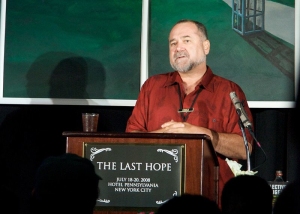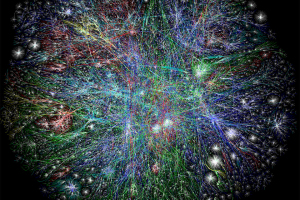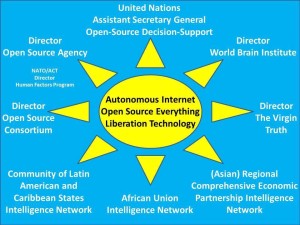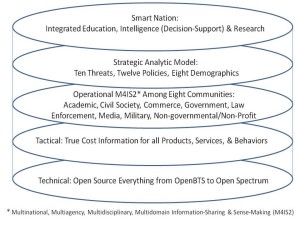
Proposal for a World Brain Institute and Development of a Global Game
·Transhumanism, December 26, 2012
[Editor's Note: The World Brain was proposed in collection of essays by H. G. Wells, wherein Wells describes his vision of the world brain: essentially a free, synthetic, universal, authoritative, and permanent “World Encyclopaedia” very much like today's Wikipedia. Wells imagined this resource would help world citizens make the best use of all available human knowledge and could therefore contribute directly to world peace.]
The Need
Four developments converged in 2009 to suggest the end of the industrial era in which treaties and military force were the principal means of governing human affairs;
- Brahimi Report calling for a renaissance in UN decision-making and decision-support
- Joint Military Analysis Centers and Joint Operations Centers
- UNIDIR call for a World Brain as a means of reducing threats and increasing prosperity
- Report of the High-Level Panel on Threats, Challenges, and Change

There is an urgent need for a new means of hybrid self-governance that reflects the diversity of human interests and capabilities. We are in the Information Era, but the United Nations (UN) and its Members are still “dumb” and unable to harness the distributed intelligence of the Whole Earth. Humanity urgently needs some form of global unified archive system without the current “top down” partitioning and access restrictions, such that all organizations and individuals can contribute their knowledge to a creative commons that leaves no knowledge sidelines, and no fraud undiscovered.
The fragmentation of knowledge, and the gap between people with power and people with knowledge, is the root cause of our universal failure to deal responsibly with the ten high-level threats to humanity.
World Information Summits and Global Knowledge Summits have not addressed the core need: to connect all human minds with one another and with all information in all languages. The UN and its Members cannot be effective in this new era without creating a United Nations Open-Source Decision-Support Information Network (UNODIN) that is “Open” in every possible sense of the word (using open source software and open spectrum, creating open source intelligence), and that allows the harmonization of what the public knows, does, and funds.

Proposed Solution
A single World Brain Institute with an infinitely-scalable online Global Game (actually a Participatory Planning and Budgeting System at all levels of governance) can be implemented immediately at a cost of under Euro $12 million a year, with the almost certain prospect of being self-funded within three years by selling very low-cost subscriptions to the one billion rich, enabling free access to the five billion poor. The World Brain and a Global Game are not new ideas—what is new is the combination of the desperate need for reliable “whole systems” analytics, and the immediate availability of open and hence affordable and scalable information and communication technologies (ICT) to meet that need.
This program, under UN auspices, would encourage regions to establish Regional Information-Sharing and Sense-Making Networks, and Members to create national call centers harnessing the eight tribes of intelligence in each country (academic, civil society, commerce, government, law enforcement, media, military, and non-governmental or non-profit) and able to educate the poor “one cell call at a time.” The UN could ask for US funding of an Office of the Assistant Secretary for Decision-Support, and create an Office of Information-Sharing Treaties and Agreements at the same time. A Strategic Analytic Model has been devised along with a concept for extending the proven concept of Participatory Budgeting while harnessing all interested humans to digitize “true cost” information on all products, services, and behaviors. This is a self-healing self-learning system with an open ethic that guarantees integrity with transparency. Within the Global Game, a Global Range of Needs Table can connect the one billion rich with the item-level needs of the five billion poor, to include free cells phones connecting the poor to knowledge.
Benefits
A (UN) World Intelligence Center was first proposed by Quincy Wright in 1957, this now-achievable program will ride the emergent wave of evolutionary activism that can potentially bypass blocking industrial-era bureaucracies and enable the poor to create infinite stabilizing wealth. The UN can become the administrator of the World Brain and Global Game™, and in this way harness the distributed intelligence of the Whole Earth while helping all achieve global learning.
Examples
ClimateGate. Hacktivism leads to public outrage as well as renewed voice by scientists who have been ignored and often repressed by the International Panel on Climate Change (IPCC), where 50 core scientists with a strong ideological belief have been able to sway another 150 participating scientists while ignoring over 5,000 dissenting scientists. If a World Brain Institute with an embedded Global Game existed, the Secretary General (SG) would be able to see on a large display a visualization of all scientists as well as public leaders and their relative position—a single institution would not be able to mislead the SG. At the same time the SG and Members would have two other benefits:
1. Climate Change would be presented in relation to ALL ten threats to humanity and in relation to all twelve core policies (Agriculture, Diplomacy, Economy, Education, Energy, Family, Health, Immigration, Justice, Security, Society, Water). It would be understood, in this context, that the social harm to the UN goals of eradicating poverty and infectious disease is greater than the benefit of reducing carbon emission in the poorest of countries, and the misrepresented data could be seen.
2. Intervention strategies could be identified and quickly communicated throughout the world. Wal-Mart, for example, has eliminated $25 million a year in truck idling costs (and the related emissions) by installing small batteries to run truck cabin systems when trucks are not in motion.
Iraq-Afghanistan. It is now clear that the US and UK decisions to invade both IQ and AF were based on ideologically-defined policy preferences, and completely refuted by both secret and public decision support. In the US those of us prepared to pay $100,000 for full-page information advertisements against the war saw our money refused by a captive press. Within the UN, there was no competing voice armed with public information to refute the lies presented to the UN by the US Administration. If a World Brain Institute with an embedded Global Game™ existed, the SG would be able to see on a large display a visualization of all leaders (not just political but religious, economic, and academic) and their relative position—a single government would not be able to mislead the SG. At the same time the SG and Members would have two other benefits:
1. The “true cost” of both invasions could be properly presented to all Members and their publics, and a rich harvest of multi-cultural perspectives factored in—the US leaders for example, were unaware of the Sunni-Shi’ite split in Iraq, or the implications of the Pakistan Sunni nuclear bomb in relation to the Iranian effort to create a nuclear deterrent against Sunnis, not the US or Israel.
2. The legitimate planning concerns of the diplomats and the commercial specialists, as well as the US military officers such as the Chief of Staff of the Army who knew full well the instability that can occur from going in “light,” could have been properly acknowledged, and a multi-national multi-cultural campaign plan developed to leverage the Golden Hour so as not to lose the peace.
Conclusion
The World Brain Institute and Global Game are the means by which the Secretary General can leverage the moral and practical value of “Open Everything,” making it possible to hear all voices, to nurture appreciative inquiry and deliberative dialog at all levels, and to achieve truth & reconciliation across failed states whose poor can be empowered with cell phone connectivity and education “one cell call at a time,” so as to create infinite stabilizing wealth in situ.
The World Brain Institute and Global Game are the means by which the SG leads the UN System in using Multinational Multiagency Multidisciplinary Multidomain Information-Sharing and Sense-Making (M4IS2) to create a prosperous world at peace.

Additional Information: http://phibetaiota.net/2009/12/reference-world-brain-institute-global-game/
###
Robert David Steele (Vivas) – U.S. Marine Corps infantry and intelligence officer for twenty years. Second-ranking civilian (GS-14) in U.S. Marine Corps Intelligence from 1988 – 1992 and a member of the Adjunct Faculty of Marine Corps University. Also former clandestine services case officer with the CIA. 25-year U.S. military and intelligence career. Currently he is Founder and CEO of OSS.net and a well known proponent of Open Source Intelligence.
He is the author of On Intelligence: Spies and Secrecy in an Open World (2000, Foreword by Senator David Boren (D-OK)), The New Craft of Intelligence: Personal, Public, & Political (2002, Foreword by Senator Pat Roberts (R-KS)), Information Operations: All Information, All Languages, All the Time (2005, Foreword by Congressman Rob Simmons (R-CT-02)), and The Smart Nation Act: Public Intelligence in the Public Interest (2006). Co-author of NATO Open Source Intelligence Handbook(2001).
Hw was also co-editor of NATO Open Source Intelligence Reader (2002) and a contributing editor of Peacekeeping Intelligence: Emerging Concepts for the Future (2003, Foreword by Dame Pauline Neville-Jones, UK).



